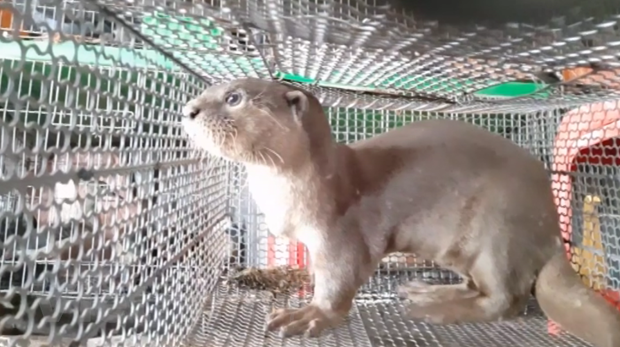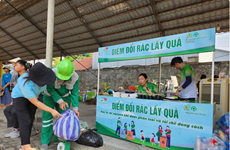Consumers support closure of wildlife markets
 Illegal wildlife trade conducted at Thanh Hoa farm produce market (Photo: H.V/VietnamPlus).
Illegal wildlife trade conducted at Thanh Hoa farm produce market (Photo: H.V/VietnamPlus).
Hanoi (VNA) – Nearly 93 percent of 1,000 Vietnamese respondents have said they are in support of the efforts of the government and ministries to close illegal and unregulated wildlife markets and restaurants.
This is the finding of an online survey conducted by GlobeScan, a strategic consulting and market research firm, in March 2020, and announced by the World Wild Fund for Nature (WWF).
93 percent back closure of wildlife markets
While the exact origins of COVID-19 remains a question, the World Health Organisation (WHO) has confirmed it is a zoonotic disease, meaning it jumped from wildlife to humans.
This fact has raised concerns among scientists and conservationists, as well as changed people’s consumption habits, saying NO to wildlife meat.
Recognising that illegal and unregulated wildlife markets are a potential source of the SARS-COVID-2 transmission, the WWF commissioned GlobeScan to conduct a public survey in China’s Hong Kong, Japan, Myanmar, Thailand and Vietnam to find their attitudes and support for the closure of all illegal wildlife markets.
The survey found out that more than 90 percent of a total 5,000 respondents from these countries said they support the governments’ actions to close illegal and unregulated wildlife markets.
Vietnamese respondents showed strong support for measures to eradicate the COVID-19 epidemic and zoonotic diseases that are likely to break out in the future due to wildlife illegal hunting, trafficking and consumption.
Nearly 90 percent of a total 1,000 Vietnamese respondents said they are very likely or likely to support efforts by the government and relevant ministries to close all illegal and unregulated markets and restaurants that sell wildlife products.
A total of 15 percent of the respondents in Vietnam said they or someone they knew had purchased wildlife products for consumption in the last 12 months.
According to the WWF, continued awareness-raising on the risks to reduce consumer demand and policy and enforcement to reduce the availability are required to remove the risk of future outbreaks and ensure that wildlife is protected.
“It is time to connect the dots between wildlife trade, environmental degradation and risks to human health. Taking action now for humans, as well as the many wildlife species threatened by consumption and trade, is crucial for all of our survival,” said Marco Lambertini, Director General of WWF International.
The Vietnam’s Ministry of Agriculture and Rural Development recently coordinated with relevant ministries to draft an urgent directive to ban illegal wildlife trade and consumption.
“Now more than ever, we feel an urgent sense of responsibility to stop future zoonotic transmissions,” said Doctor Van Ngoc Thinh, Country Director of WWF-Vietnam.
He added that the WWF stands ready to work with the Government of Vietnam and relevant ministries to translate the directive into actions and put an end to the consumption and trade in wildlife.
Stronger actions needed
Recently, the Humane Society International (HSI) sent a letter to the Government of Vietnam proposing the closure of illegal wildlife markets to prevent the spread of epidemics in the future.
In its letter, HSI spoke highly of Vietnam’s initial achievements in the fight against COVID-19, as well as recognised the active moves of the Vietnamese Government in natural conservation and wildlife protection.
Vietnam should organise large-scale inspections of wildlife farming facilities and promptly detect and strictly handle violations in accordance with law, especially infringements of the origin of domestic animals, it suggested.
The country should enhance coordination with foreign governments to increase information and policies sharing to reach a common goal of eradicating the risks of epidemic outbreaks that are directly linked to wildlife trafficking.
Furthermore, it is important to increase public-awareness raising campaigns, according to HSI.
According to the WHO, the current COVID-19 pandemic, along with at least 61 percent of all human pathogens, is zoonotic in origin. Other recent epidemics, including SARS, MERS and Ebola, have also all been traced back to viruses that spread from animals to people.
The illegal wildlife trade is the second-largest direct threat to biodiversity globally, after habitat destruction./.













